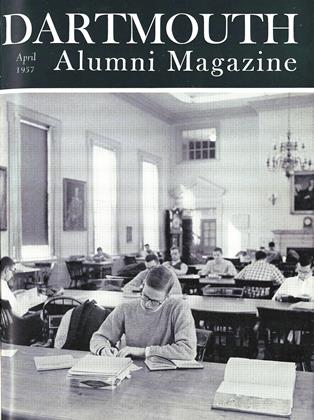By LaurenceHewes '24. New York: Alfred A. Knopf,1957. 262 pp. $4.75.
When Lawrence Hewes graduated from Dartmouth in 1924, he tells us in this interesting, well-written account of his life as a public servant, his only desire was "to conform to prevalent notions of respectability and status." Two early attempts to climb the ladder of success, first as a longshoreman on the San Francisco waterfront and, for a few F. Scott Fitzgerald years, as a bond salesman on Market Street, ended in failure. Then, in the depths of the depression, a temporary job with the Federal Land Bank in Berkeley launched him upon a varied career in public administration.
Moving from the financial problems of stricken farmers to rural relief work, he became one of Tugwell's assistants in the early days of the Resettlement Administration. After 1936, in the Farm Security Administration, he was director for the San Francisco Bay area. When war came he and his staff had much to do with the relocation of Japanese Americans on the West Coast to Tule Lake. Another assignment in this period was to organize farm labor recruitment in Mexico. At war's end he helped formulate the land reform program in Japan. In recent years he has been engaged in land reclamation in Colorado.
The title Boxcar in the Sand symbolizes the theme that unifies the diversity of his career. As a child he had the vivid experience of his father's failure to develop a ranch on poor sandy soil in the upland range country of central Oregon. He never forgot how the dust storms blew away his family's work and hopes. Preoccupation with agrarian error and failure, and concern for conservation and intelligent management of natural resources, became the guidelines to his long career in public service. The reader finishes this book with the sense of having reviewed a life well and fully spent, compassionately, in the interest of enduring American objectives.
 View Full Issue
View Full Issue
More From This Issue
-
 Feature
FeatureA New Educational Program
April 1957 -
 Feature
FeatureNever Say Die or Adversity Foiled the Story of 100 Years of Rowing
April 1957 By CLIFFORD L. JORDAN '45 -
 Feature
FeatureAlumni to Honor Richard Hovey
April 1957 -
 Feature
FeatureMemories of Hovey
April 1957 By EDWIN O. GROVER '94 -
 Class Notes
Class Notes1918
April 1957 By ERNEST H. EARLEY, RICHARD A. HOLTON -
 Class Notes
Class Notes1931
April 1957 By JOHN H. RENO, WILLIAM F. STECK
GEORGE F. THERIAULT '33
Books
-
 Books
BooksALUMNI PUBLICATIONS
May 1921 -
 Books
BooksMr. Charles Edward Banks, M.D. '78
MARCH 1931 -
 Books
BooksTHE LATE GREAT CREATURE.
APRIL 1972 By J. DONALD O'HARA '53 -
 Books
BooksTHOMAS B. REED; PARLIAMENTARIAN
February, 1931 By Leon B. Richardson -
 Books
BooksFlood Tide
May 1918 By M.J.F. -
 Books
BooksWhat If?
June 1981 By R. H. R.



